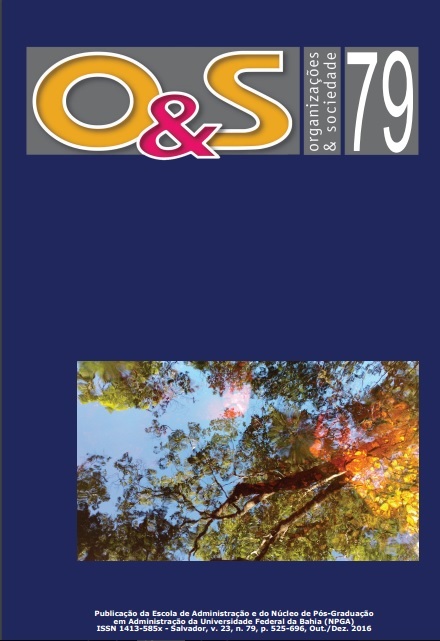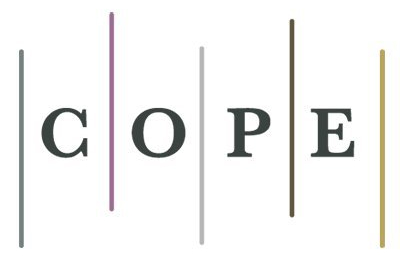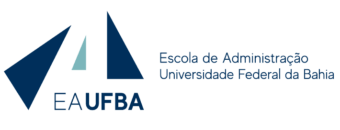Editorial
Resumo
Dear O&S readers,
This last O&S issue in 2016 inaugurates the Annual English Edition. Besides helping to accomplish some publication standards from important databases where O&S is indexed, this edition will allow O&S to reach a broader audience, thus increasing the visibility not only from the journal but also from the scholars who published their contributions in O&S.
As we announced in the first editorial in 2016, this year was characterized by new challenges for O&S and its editorial team. Maybe one of the main issues to be circumvented is related to the financial restrictions that might hamper the quality and the responsiveness of the outlet. These difficulties are even greater in public institutions funded by the Brazilian federal government, given the existing fiscal constraints. However, thanks to important partners who are in our side, we were able to deal with the external problems. In this sense, we would like to acknowledge the invaluable support provided by IBEPES and in particular from Edson Guarido Filho, Luciano Rossoni and Diego Coraiola. Without their help we would not be able to keep O&S on an excellence track. We are sure that the year 2016 paves our partnership.
In 2016, we also have consolidated our editorial practice by following our deadlines and editorial standards in a focused and transparent fashion.. We have also maintained (or at least tried) our quality standards and we have strengthened the relationship channels with authors and reviewers. As a result, O&S expanded and included more readers and authors from various regions of Brazil and abroad.
We reach the vol. 6, number 79 of O&S with articles reflecting the relevance and dynamics of the organizational studies field in Brazil. This aspect is easily noticed by the keywords of the nine articles comprising this edition, such as: work intensification; individual values; labour relations; high-performance; work systems; knowledge transfer; learning; organizational capabilities; institutionalization; public Ombudsmen; regulatory agencies; spirituality; organization studies and History; Archives; documents; urban entrepreneurialism; FIFA World Cup; Institutionalism; Ideal Types; Quality of Working Life; human behavior at work; functional music; public policy, agenda-setting, agenda denial; policy formulation. And, obviously: Organizations & Society.
First, Pressure, Performance and Prestige: Dilemmas for Contemporary Professionals is the first paper presented in this edition. In this paper, Ana Heloisa Costa Lemos, Leila Sharon Nasajon Gottlieb and Alessandra de Sá Mello da Costa demonstrate the negative implications of work intensification, such as an increase in the working loads, excessive pressure and sacrifices in personal lives, as well as other aspects considered positive, such as learning, professional growth, autonomy and financial gains.
The second paper - Knowledge transfer, Learning and Organizational Capabilities in an inter-organizational software project is from Silvio Popadiuk and Rosane Maria Soligo de Mello Ayres. In this piece, the authors aim to describe how learning and knowledge transfer mechanisms based on knowledge articulation and codification contribute to the development of organizational capabilities. By using the software sector as context, they evidenced the role of organizational efforts focused on knowledge articulation practices and on activities to develop client-specific capabilities. They also highlight the importance of knowledge codification practices.
Luciana de Oliveira Miranda and Paulo Carlos du Pin Calmon lead the paper Institutional Change in Brazilian Public Administration: The case of the Ombudsman’s Offices in Federal Regulatory Agencies. Their study seeks to understand the process for the institutionalization of Ombudsman’s Offices in federal regulatory agencies. The study show the existence of proactive actions by agents of change involved with the observed Ombudsmen teams in the study.
Spirituality in organizations? This question guides the fourth article in our English edition. Edivandro Luiz Tecchio, Cristiano José Castro de Almeida Cunha and Fabiana Besen Santos aim to analyze how national and international scholarship have been dealing with the organizational spirituality topic. The authors studied 118 full-documents available in Scopus and SciELO databases. They identified seven major themes about the subject: factors that encourage spirituality to development in organizations; the differences between spirituality and religion; the definition/concept of organizational spirituality; the benefits of spirituality for organizations; the dimensions of spirituality in organizations; the values of spirituality in organizations; and ways of identifying/ measuring spirituality in organizations.
Fifth, Amon Barros offers us Archives and the “Archive”: dialogue and an agenda of research in organization studies. This text considers the “Archive” as a concept and a transitional space and also stimulates discussions from history and organizations in terms of theoretical and methodological concerns involving the use of archives. The paper concludes that archives and the Archive are constituent elements of practices and structures.
Clarice Misoczky de Oliveira and Maria Ceci Misoczky present the paper Urban Entrepreneurialism in FIFA World Cup host cities: the case of Porto Alegre. This paper analyzed the practices implemented in Porto Alegre in Large Urban Projects (LUPs) associated to the 2014 FIFA World Cup. An instrumental case study was performed, and three three units of analysis were incorporated: mobility, stadiums and the waterfront. Their findings indicate how each project is connected to urban entrepreneurial strategies.
The seventh article in this edition is A criticism of the use of ideal types in studies on institutional logics. The author, Guillermo Cruz, seek to reflect on the use of ideal types by some authors from institutionalism in studies. He argues that there is a misreading of what is advocated by Weber with respect to ideal-type construction, ignoring the issue of axiological neutrality and the impossibility of ideal types being found empirically. In this respect, he argues that the way in which ideal types are used in studies on institutional logics needs to be reconsidered.
Eight, the paper Qualit of working life and music in the manufacturing workplace tackles an interesting topic: music and organizations. In this paper, Walid Abbas El-Aouar, César Ricardo Maia de Vasconcelos and Alipio Ramos Veiga Neto aimed to understand how the insertion of music in the work environment contributes to achieving Quality of Working Life (QWL), from the perspective of biopsychosocial and organizational well-being. They concluded that musical insertion provides biological, social and, above all, psychological and organizational well-being to the co-workers, thus contributing to obtain QWL in the workplace.
Lastly, Ana Cláudia Niedhardt Capella presents Agenda-setting policy: strategies and agenda denial mechanisms. Her work focuses on an aspect overlooked in literature on policy formulation: agenda denial, i.e. the political process by which issues are kept from policymakers’ consideration and deliberation. The author argues that the power to keep an issue off the agenda is exercised through non- recognition or denial of the problem, discrediting the issue itself or the group directly related to it, the co-optation of leaders or the group’s symbols, postponement and formal denial, among other mechanisms. This study explores these actions, seeking to contribute to research on public policy and agenda setting in public organizations
We wish excellent reading and our best regards! Editors
Ariádne Scalfoni Rigo
Sandro Cabral
Downloads
Downloads
Publicado
Como Citar
Edição
Seção
Licença
Esta obra está licenciada sob uma Licença Creative Commons Attribution 4.0.
A O&S adota a Licença de Atribuição do Creative Commons 4.0 em todos os trabalhos publicados, exceto, quando houver indicação específica de detentores de direitos autorais.






